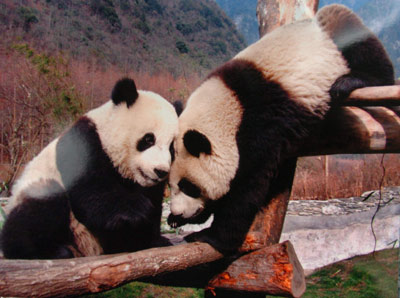Taiwan on Friday declined to accept a goodwill gift of two giant pandas from
the mainland, a decision that has met with criticism from across the Taiwan
Straits.
One mainland expert on Taiwan described the decision as "an unwise and
short-sighted move" that will only increase Taiwan people's dissatisfaction with
the ruling Democratic Progressive Party (DPP).

Two pandas play at
the China Giant Panda Research Centre in Wolong, Southwest China's Sichuan
Province in this undated photo. [Xinhua] |
The island's "council of agriculture" announced late on Friday that Taiwan
was unable to accept the animals because they would not receive proper care in
Taiwan as required by animal protection laws and international agreements.
"Under present circumstances, we cannot accept the pandas in Taiwan," said
Lee Tao-sheng, deputy director of the forestry bureau under the "council of
agriculture."
He added that the decision had been made in accordance with "wild animal
conservation laws," adding that "the majority of conservation groups and experts
were opposed to importing the giant pandas."
Lee said applications to house the pandas from Taipei City Zoo and the Leofoo
Village Theme Park, located in Hsinchu County, did not focus enough on research
and education.
"The current plans to exhibit and strengthen the teaching of wildlife
protection are not concrete enough," Lee told reporters after final discussions
by a panel of experts, without elaborating.
The zoo and the park, however, said they had invested heavily in facilities
for the endangered animals and could accommodate them.
Beijing made the panda offer as a goodwill gesture last May when Lien Chan,
the then leader of Taiwan's opposition Kuomintang (KMT), visited the mainland.
The pandas were picked from 11 animals at the Wolong Giant Panda Research
Centre in Southwest China's Sichuan Province. They were named Tuantuan and
Yuanyuan, from the Chinese word tuanyuan which means "reunion."
Friday's announcement came a week after Taiwan leader Chen Shui-bian urged
mainland leaders to keep the pandas in their natural habitat.
Although the mainland gesture was well received by more than 70 per cent of
Taiwan people, the "independence"-minded Chen and his DPP administration have
repeatedly denounced the offer as a propaganda ploy.
Li Jiaquan, a senior researcher with the Institute of Taiwan Studies under
the Chinese Academy of Social Sciences, said Taipei's decision was politically
motivated.
"The sole reason is that Chen and his DPP administration fear closer
cross-Straits exchanges will foil their secessionist attempts," he told China
Daily.
"They have done their best to worsen cross-Straits relations rather than seek
peace and stability."
The researcher stressed that the DPP's rejection of the pandas went against
the common aspirations of people across the Straits for stable bilateral ties.
"By putting their self-interests above public welfare, the DPP will further
erode people's support for them," Li said.
The opposition KMT immediately criticized the DPP administration's rejection
of the pandas.
"There is absolutely no doubt that the rejection was made
out of political considerations," said Chang Jung-kung, director of the KMT's
mainland affairs division.